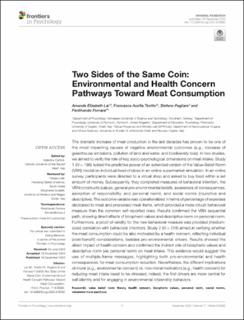| dc.description.abstract | The dramatic increase of meat production in the last decades has proven to be one of the most impacting causes of negative environmental outcomes (e.g., increase of greenhouse emissions, pollution of land and water, and biodiversity loss). In two studies, we aimed to verify the role of key socio-psychological dimensions on meat intake. Study 1 (N = 198) tested the predictive power of an extended version of the Value-Belief-Norm (VBN) model on individual food choices in an online supermarket simulation. In an online survey, participants were directed to a virtual shop and asked to buy food within a set amount of money. Subsequently, they completed measures of behavioral intention, the VBN constructs (values, general pro-environmental beliefs, awareness of consequences, ascription of responsibility, and personal norm), and social norms (injunctive and descriptive). The outcome variable was operationalized in terms of percentage of expenses dedicated to meat and processed meat items, which provided a more robust behavioral measure than the common self-reported ones. Results confirmed the VBN sequential path, showing direct effects of biospheric values and descriptive norm on personal norm. Furthermore, a proof of validity for the new behavioral measure was provided (medium-sized correlation with behavioral intention). Study 2 (N = 218) aimed at verifying whether the meat consumption could be also motivated by a health concern, reflecting individual (cost/benefit) considerations, besides pro-environmental drivers. Results showed the direct impact of health concern and confirmed the indirect role of biospheric values and descriptive norm (via personal norm) on meat intake. This evidence would suggest the use of multiple-frame messages, highlighting both pro-environmental and health consequences, for meat consumption reduction. Nevertheless, the different implications of moral (e.g., environmental concern) vs. non-moral motivators (e.g., health concern) for reducing meat intake need to be stressed: indeed, the first drivers are more central for self-identity and for engaging in environmental citizenship behaviors. | en_US |

